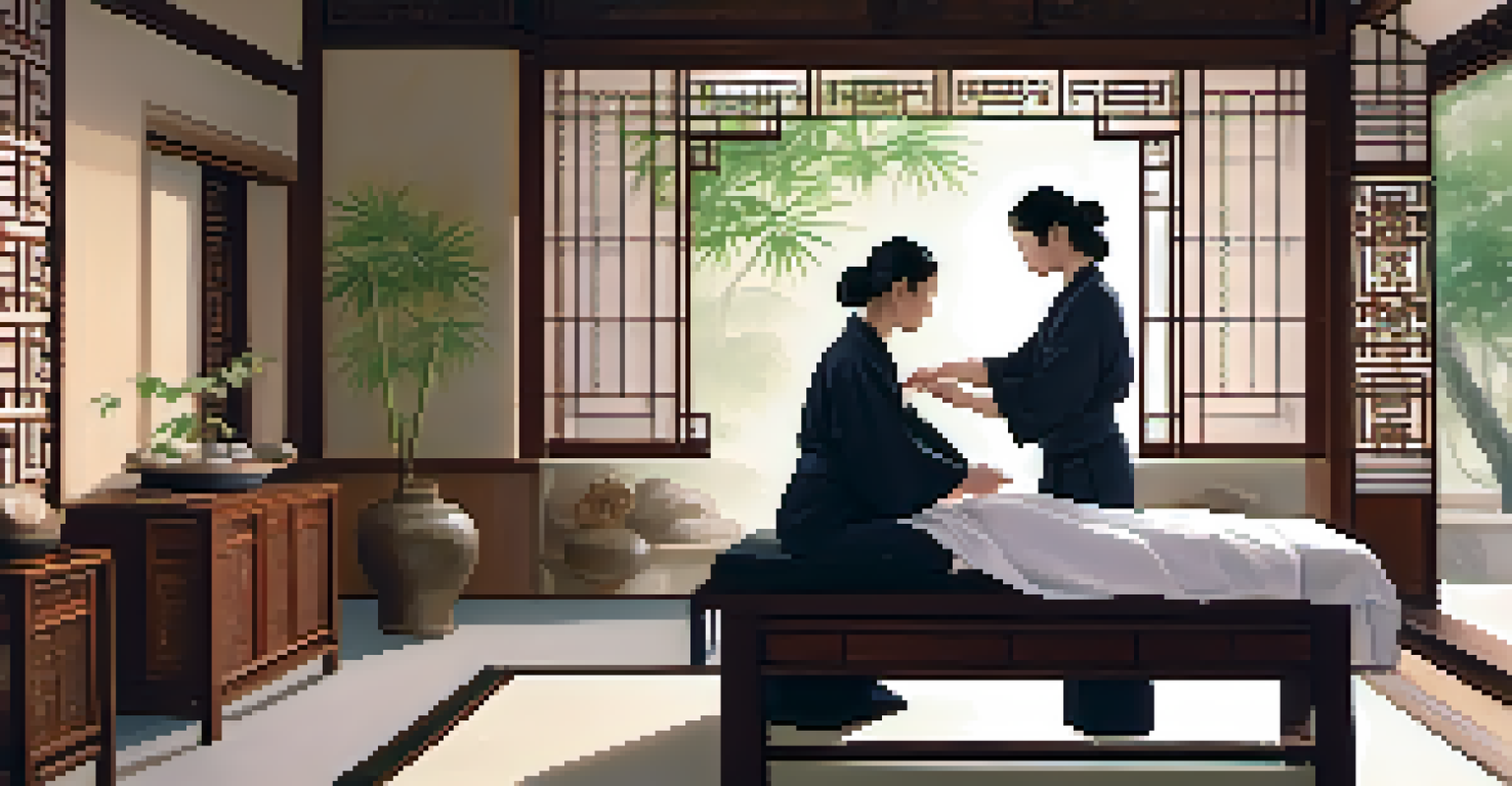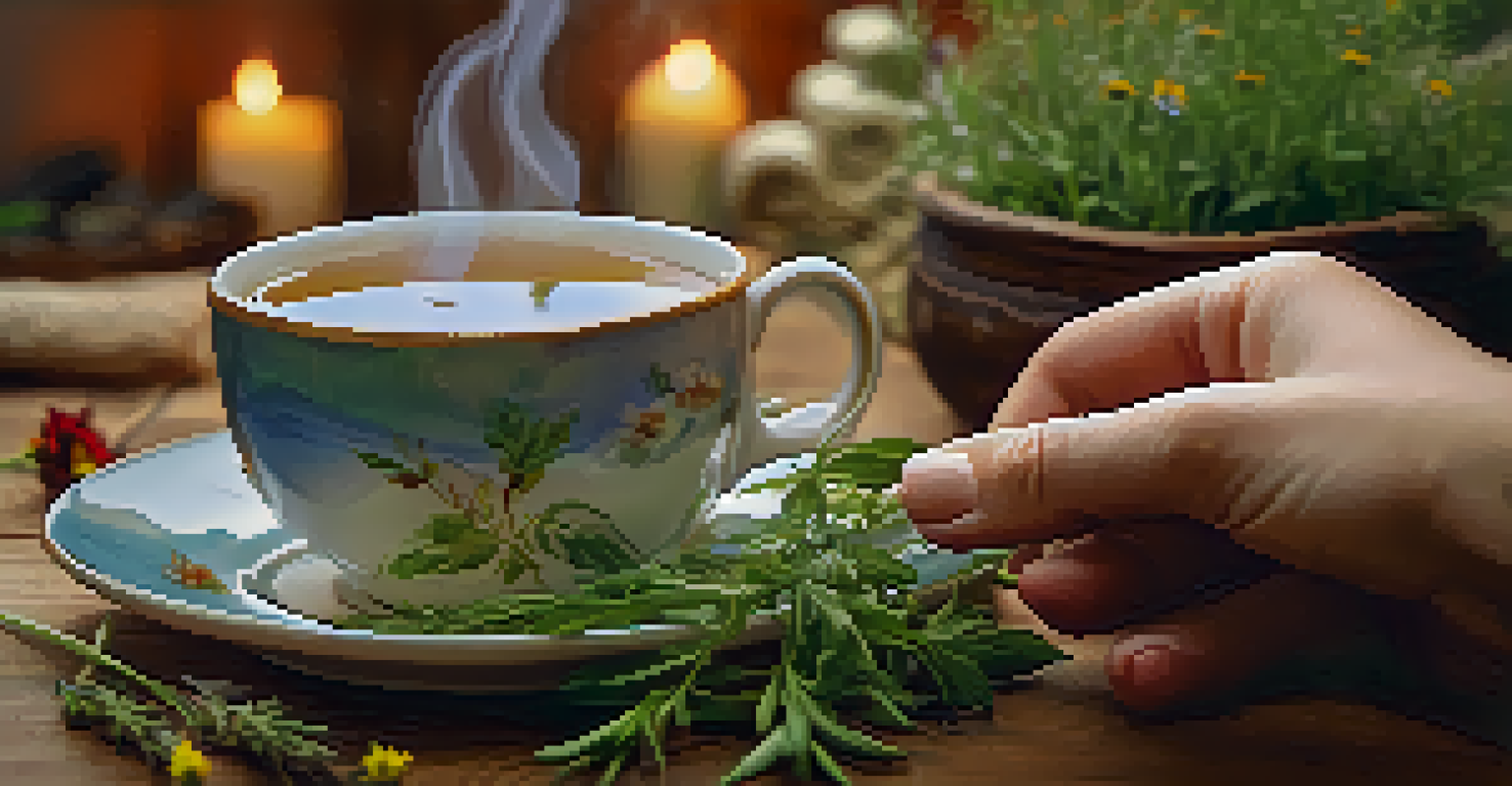Integrating Traditional Chinese Medicine in Spa Practices

Understanding Traditional Chinese Medicine (TCM)
Traditional Chinese Medicine (TCM) is an ancient healing system that has been practiced for thousands of years. It emphasizes the balance of energy, or 'Qi,' within the body, and uses various methods to restore this balance. TCM encompasses practices like acupuncture, herbal medicine, and Tai Chi, all aiming for holistic wellness.
The greatest wealth is health.
At its core, TCM is about viewing the body as an interconnected whole rather than a collection of parts. This perspective encourages a deeper understanding of health and wellness, making it a valuable addition to modern spa practices. By integrating TCM, spas can offer a more comprehensive approach to relaxation and healing.
The principles of TCM can enhance spa treatments by addressing not just physical symptoms but also emotional and spiritual well-being. This holistic approach can resonate with clients seeking more than just a surface-level experience during their spa visits.
The Role of Qi in Spa Treatments
In TCM, 'Qi' is the vital energy that flows through the body, influencing health and vitality. When Qi is blocked or imbalanced, it can lead to physical discomfort or emotional distress. Spa practices that incorporate TCM aim to promote the smooth flow of Qi, helping clients achieve a deeper state of relaxation.

Techniques such as acupressure and massage can be particularly effective in releasing stagnant energy. For instance, a skilled practitioner can apply pressure to specific points along the body's meridians, aiding in the flow of Qi and enhancing overall wellness. This targeted approach can transform a standard massage into a more profound healing experience.
TCM Enhances Spa Wellness Approaches
Integrating Traditional Chinese Medicine (TCM) allows spas to provide a holistic experience that addresses physical, emotional, and spiritual well-being.
By focusing on the movement of Qi, spas can create treatments that not only relax the body but also rejuvenate the mind. This dual benefit can lead to a more holistic sense of well-being, making clients feel revitalized long after their session ends.
Incorporating Herbal Remedies in Spa Treatments
Herbal medicine is a cornerstone of TCM, utilizing various plants and natural substances to promote health. In spa settings, herbal infusions and treatments can enhance the sensory experience while delivering therapeutic benefits. For example, incorporating herbal teas or oils into treatments can deepen the client’s relaxation.
Healing is a matter of time, but it is sometimes also a matter of opportunity.
Many spas now offer herbal baths or steam treatments that draw on traditional recipes. These not only provide physical benefits, such as improved circulation and skin health, but also engage the senses, creating a more immersive experience. Using herbs like chamomile or ginseng can soothe the body and mind.
Moreover, educating clients about the properties of these herbs can enhance their understanding and appreciation of the treatments. When clients know how these natural elements work, they feel more connected to their spa experience, fostering a sense of trust and loyalty.
Mindfulness and Meditation in Spa Practices
Mindfulness and meditation are integral aspects of TCM, offering tools for mental clarity and emotional balance. Many spas have begun incorporating these practices into their offerings, enhancing the relaxation experience. For instance, guided meditation sessions can help clients cultivate a sense of peace before or after treatments.
Creating a tranquil environment that encourages mindfulness can significantly impact a client’s overall experience. Soft music, calming scents, and a serene atmosphere contribute to a space where clients can let go of stress and focus on their well-being. This holistic setting aligns beautifully with TCM principles.
Personalized Treatments Foster Loyalty
By customizing spa experiences based on individual needs and health conditions, practitioners can enhance client satisfaction and encourage repeat visits.
By promoting mindfulness, spas not only help clients relax but also empower them with techniques they can use in their daily lives. This approach fosters a deeper connection between the client and the spa, encouraging them to return not just for treatments, but for personal growth and wellness.
Acupuncture and Its Benefits in Spa Settings
Acupuncture, a well-known TCM practice, involves inserting thin needles into specific points on the body to stimulate energy flow. Many spas are now offering acupuncture as part of their treatment menu, providing clients with the benefits of this ancient technique in a serene environment. The calming atmosphere of a spa can enhance the effectiveness of acupuncture.
This treatment is known to alleviate various conditions, from stress and anxiety to chronic pain and insomnia. Clients often report feeling a profound sense of relaxation and relief after an acupuncture session. By integrating this practice, spas can cater to a wider range of health concerns and preferences.
Moreover, acupuncture can be paired with other spa services, creating a comprehensive wellness package. For example, a client might enjoy a relaxing massage followed by acupuncture, maximizing the benefits of both treatments and ensuring a unique experience.
Creating Customized Spa Experiences with TCM
One of the most appealing aspects of TCM is its emphasis on individualization. Each person is unique, and their treatment should reflect their specific needs and health conditions. Spas that adopt this approach can create tailored experiences that resonate with each client, enhancing satisfaction and results.
For example, a consultation before treatments can help practitioners understand a client's health history, lifestyle, and wellness goals. Based on this information, they can recommend specific TCM techniques, herbal remedies, or relaxation methods that align with the client's needs. This personalized touch can make the spa experience feel more special and effective.
Future Trends Favor TCM Integration
As clients increasingly seek holistic health solutions, spas that incorporate TCM practices will stand out in a competitive market.
By offering customized treatments, spas not only address individual concerns but also build lasting relationships with clients. This approach encourages repeat visits and fosters a community of wellness-seekers who value the holistic benefits of TCM.
The Future of Spas with TCM Integration
As wellness trends evolve, the integration of TCM into spa practices is likely to become more prevalent. Clients are increasingly seeking holistic approaches that address both physical and mental health, making TCM a natural fit for modern spas. The growing interest in alternative therapies is paving the way for this integration.
Spas that embrace TCM can differentiate themselves in a competitive market, attracting clients who are looking for unique and effective treatments. By offering a blend of traditional and contemporary practices, these spas can create an inviting space that caters to a diverse clientele.

Looking ahead, education will play a crucial role in the successful integration of TCM in spa environments. By training staff on TCM principles and techniques, spas can ensure that clients receive not only effective treatments but also valuable knowledge about their health and wellness journey.